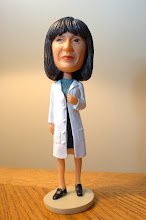As we are often reminded, our country is fighting the battle of the bulge. It should be no surprise that researchers are conducting studies on the effects of how, when & what we eat. There is a related series of studies that really caught my attention - they involved post-exercise eating. These three related studies measured insulin responses to varying carbohydrate-containing meals consumed after a workout and the results were interesting. If you are an athlete in training, none of this applies to you, but for the rest of us I think it is good to know. So what exactly did they study?
In the first study, participants exercised to burn 500 calories per day for 6 days and were given either a high carb drink or nothing immediately after exercise. The group that drank nothing had a 40% increase in insulin efficiency, while those who had the high carb drink showed no benefit. Wow! 40% you say - uh, what does that mean?
Science Lesson: Low intensity/endurance exercise creates ATP (adenosine triphosphate) via oxidation of triglycerides, while moderate to high intensity exercise creates ATP via metabolism of glycogen. Insulin efficiency is more likely to increase during metabolism of glycogen. The muscle contractions act like insulin during exercise, promoting the transport of glucose from the blood to the muscle cells. Exercise training increases glucose tolerance by increasing sensitivity to insulin, which can be measured by looking at lowered blood sugar levels. Which means even though your muscles need more glucose during exercise, your body needs less insulin to supply it.
The study results intrigued the scientists so the next study had two groups exercise for 75 minutes and then fed one group a meal of balanced carbs (intake = expenditure) and the other a 100 gram deficit of carbs; both meals were equal in calories. The group fed the low-carb meal had a better insulin response than the balanced-carb group. In the final study, the researchers wanted to know if the timing of the calorie intake mattered. The participants were given identical meals either before, immediately after or three hours after exercising for 75 minutes. There was no difference among any of the groups in their insulin responses.
So, at least from these early results, it appears that it is best not to eat, or at least eat something low in carbs, after exercising to get the most benefit from your workout. Darn, I guess no more doughnuts on Saturday mornings after my Pilates class! :)
In the first study, participants exercised to burn 500 calories per day for 6 days and were given either a high carb drink or nothing immediately after exercise. The group that drank nothing had a 40% increase in insulin efficiency, while those who had the high carb drink showed no benefit. Wow! 40% you say - uh, what does that mean?
Science Lesson: Low intensity/endurance exercise creates ATP (adenosine triphosphate) via oxidation of triglycerides, while moderate to high intensity exercise creates ATP via metabolism of glycogen. Insulin efficiency is more likely to increase during metabolism of glycogen. The muscle contractions act like insulin during exercise, promoting the transport of glucose from the blood to the muscle cells. Exercise training increases glucose tolerance by increasing sensitivity to insulin, which can be measured by looking at lowered blood sugar levels. Which means even though your muscles need more glucose during exercise, your body needs less insulin to supply it.
The study results intrigued the scientists so the next study had two groups exercise for 75 minutes and then fed one group a meal of balanced carbs (intake = expenditure) and the other a 100 gram deficit of carbs; both meals were equal in calories. The group fed the low-carb meal had a better insulin response than the balanced-carb group. In the final study, the researchers wanted to know if the timing of the calorie intake mattered. The participants were given identical meals either before, immediately after or three hours after exercising for 75 minutes. There was no difference among any of the groups in their insulin responses.
So, at least from these early results, it appears that it is best not to eat, or at least eat something low in carbs, after exercising to get the most benefit from your workout. Darn, I guess no more doughnuts on Saturday mornings after my Pilates class! :)





1 comment:
Will you pls write an article on food expiration dates, i.e. how do we know when perishables have actually perished?
Post a Comment